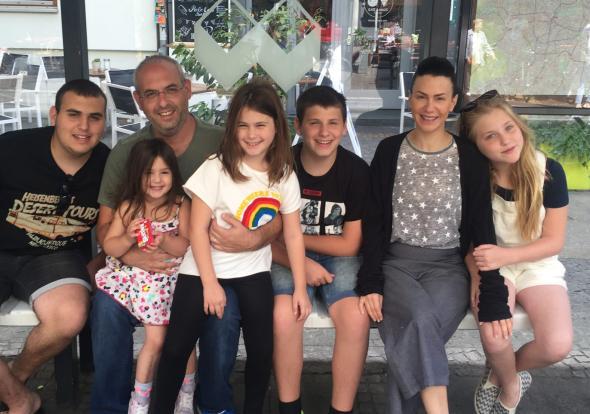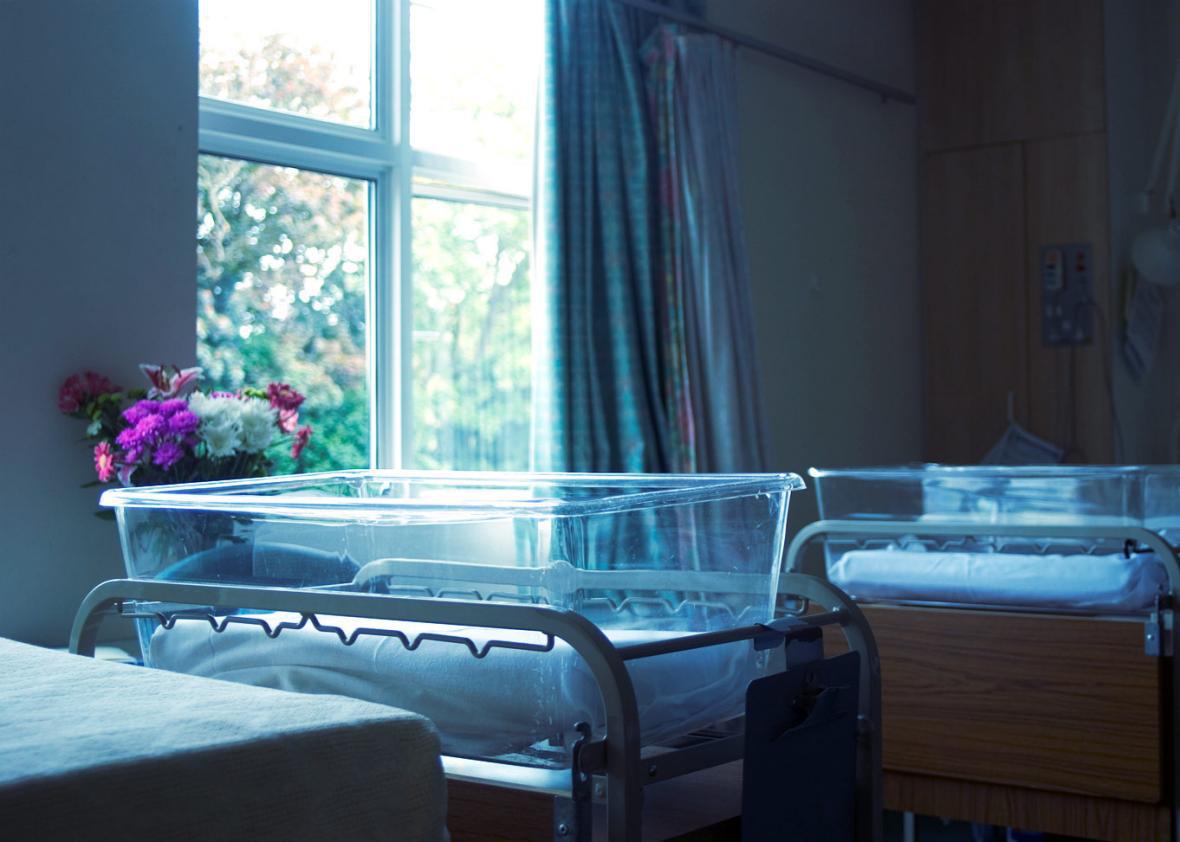During my 18 hours in Room 6, many people came and went, and most of them kept quiet. That’s what it’s like with a stillbirth. Even the doctors are silent meeting death where they expect to find life.
One doctor walked in taking the last bite of a sandwich. He apologized politely. He was on a long shift, he said, and this had been his first chance to grab something to eat. I thought how lucky he was to have the taste of food in his mouth, how lucky his life hadn’t collapsed in the blink of an eye and he could feel hunger.
About 3 out of every 1,000 births in Israel is a stillbirth. The word for stillbirth in Hebrew, leida shketa, translates literally as “silent birth,” suggesting what’s missing: the cry of a healthy baby. It’s a birth in every other sense: induction, contractions, delivery room. Sometimes the fetus dies in utero because of a birth defect or an umbilical cord obstruction; in the majority of cases, as it was in ours, the cause is unknown.
A few hours earlier, my husband, Yuval, and I were on our way to the hospital, 39 weeks pregnant with twin boys. In a few more hours, we would become a family. We had done everything we were supposed to. We ordered a layette. We moved from a one-room apartment above a sandwich shop in a neighborhood swarming with singles to a quiet, more upscale area filled with people pushing strollers. We were ready.
Yuval dropped me at the emergency room entrance and went to park the car; I headed to the maternity ward on my own. With twins it can be hard to locate the heartbeat at first, but I knew where each of the boys nestled inside me; the three of us had already spent a long time together. The one on the right was a real action hero; his brother on the left was more easygoing but no less present. I instructed the midwife on where to search for them, and suggested that she start with the one on the left. “His heartbeat is always located first—he’s just more cooperative,” I joked. “His brother is a different story.”
I remember her fumbling for long minutes. I remember thinking it must be her first shift straight out of nursing school. “Are you here by yourself, or is someone with you?” she asked. She stepped into the hall to call Yuval. These were our final moments before our universe collapsed.
Yuval came in with a worried look. Right behind him was the midwife and a doctor, both of them explaining that we would need an ultrasound to locate the heartbeats. Yuval held my hand as he had through every ultrasound. The doctor stared at the screen, put down the probe, and told us that the life within me had ended.
* * *
It was my second pregnancy. The first one ended after 22 weeks. At the time we felt unlucky and grief-stricken, feeling the full blow of parting with our fantasy.
Four months after we said goodbye to our first daughter, when the gynecologist identified two heartbeats, I thought this was God’s compensation. There was poetic justice in these two who had come to console my womb. And what a privilege to be able to get pregnant so easily.
When I was on bed rest, I would stretch my arms all the way out in front of me and feel my belly end at the tips of my fingers. I spent much of my time obsessing over the chances I had of going back to my pre-pregnancy jeans after this alien experience. My main concern, though, was to reach week 36 like the doctor ordered, to steer clear of the dangers of a premature delivery. I watched over the pregnancy grandly, and it watched over me. Until someone up there fell asleep on his watch.
* * *
How do you come to terms with such a thing? The truth is, you don’t. For an hour and a half I screamed at the heavens, wailing in a voice I didn’t know I had. When my eyelids felt swollen beyond recognition, I finally understood the meaning of the phrase “My tears have all dried up.”
Then I realized the hardest was still to come: I had to give birth.
And before that, we had to convey the news to our family—to call my concerned and loving dad, to call Yuval’s parents who had been on “twin alert” for days and tell them that their dream of grandchildren had been shattered. My father was with us within half an hour. I’d seen him cry only a few times in my life, and this was the hardest of all.
There are no special wards or delivery rooms for stillbirths. Our parents waited outside a regular delivery room in the company of jubilant grandparents talking on their cellphones about full dilation and congratulations, what a perfect grandchild and what a brave mother.
When my father hugged me, all I could say was, “I’m so sorry, Dad, I’m so sorry.” I was sorry for the disappointment I caused him, for his pain and sadness. For not being able to fulfill that one simple expectation of giving him grandkids.
Eighteen hours later, I push, and my firstborn is out. I was sure that the one on the right would be born first; he had the characteristics of a firstborn. He probably cut his brother some slack, I think. A few minutes later and the one on the left joins his older brother. The medical team pressures me to hold them, say goodbye, kiss them a first and final time. One of the midwives tells me how beautiful they are, my dead babies, and how important it is for my grieving process to say goodbye.
But I know that seeing them will make me lose my mind. Deep inside, I know that the little life I still have left in me will be gone if I hug my dead children. What kind of a mother doesn’t want to see her babies? I think as I’m being stitched up.
Everything is a painful blur, but the certainty that I must save myself is as sharp as a needle. Just like Lot’s wife, I know that I mustn’t look back. That if I look back, I will turn into a pillar of salt. So in order to survive, I choose to be the mother who leaves behind her dead children. On March 7, 1999, in Room 6, I choose life.

Einat Nathan
* * *
I find myself back at home, standing in my shower, my body wounded, my stitches painful, milk dripping from my breasts. How I had waited to shower in the comfort of my own home! No one had warned me about this cruel moment when my milk would come in and remind me I had no one to feed with it. I sat on the floor of the shower, the water running, tears and milk washing over me. The birth was behind me, but the rest of my life lay ahead.
“Mazel tov!” cheered the grocer, the barber, the sweet neighbor next door, and the other kind people who had no idea of our misfortune. I squirmed knowing how uncomfortable they would feel when I replied. I stared at myself in the mirror and stepped into the street, whole on the outside but shattered and broken on the inside. Staring at passers-by, I wondered which of them was as crushed as I was. It was obviously a lie: this camouflage of clothes, a smile, makeup, a stroll. If only the shattered people carried a sign, a small mark of Cain so that we could be gentler with them, maybe smile at them a bit more—not to pity them but to console. So that we could identify one another, meet each other’s internal devastation and know that under the protective shell there are bleeding wounds of loss.
After two weeks back at home, it all becomes clear. Life is short, so we choose joy. My husband and I love each other, and we hang on to that love because it’s the only life preserver provided us. We fly to New York because it’s far from here and from the pitying looks of kind people. Maybe there we’ll be able to not feel sorry for ourselves and remember the most important thing: that we are stronger than this, that our union can bring us great happiness, that great happiness is a choice and that we choose it every day anew. In the sadness that engulfed us, we were hungry for joy.
For three weeks we walked a strange country, spending money and love. The joy came back to my body. On March 9 a year later, in a different hospital, I gave birth to Eyal, 7 pounds and 3 ounces of life. When I held him for the first time, I held my twins, too. I greeted Eyal and said goodbye to my twins. I cried for the joy of this meeting, I cried for that separation, I cried because I won, and I cried for what I had lost, and mostly I cried because Eyal was crying, and what a joy it is to hear a baby’s cries in the delivery room.
* * *
Leida shketa, or “silent birth,” is misleading. The silence in the absence of a crying baby is deafening. I don’t know why it happened to me. But I know that my marriage forged a new alliance of which a new love was born, a love that withstood some of the worst pain life has to offer a couple at just 28 years old.
Today I know that we gained life, that we gained perspective, faith, and will, and that the disaster that struck us then made us the parents we are today. I know that the two babies who perished in my womb turned me into a different kind of mother to the five children I’m raising today. When I face the daily difficulties of motherhood, I am grateful for every “regular problem” life throws my way. I know I have been blessed with the privilege to appreciate a crying baby, because I have been to a place where babies don’t cry.
And sometimes, when I see a mother pushing a stroller with twins, I smile to myself. When I get home, I dance in the kitchen with my kids—joyful dancing to music. Because silence and children don’t go together.
